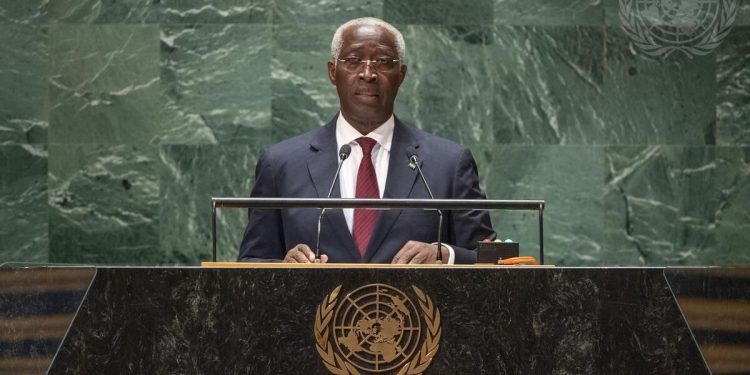The newly appointed Prime Minister of Gabon, Raymond Ndong Sima, who was appointed two weeks ago to head the country’s military government, has told world leaders at the ongoing United Nations General Assembly that the military overthrow of Ali Bongo was a lesser of two evils that could have befallen the country.
He claimed that the bloodless coup was the result of a flawed political system and that it was a proactive move by the military to stop widespread protests, a greater evil that might have caused deaths and destruction.
The coup d’etat on August 30, which was led by the head of the country’s republican guard, Brice Oligui Nguema—now the acting president of Gabon—came after President Ali Bongo Ondimba was declared the winner of an August 26 presidential election.
Ndong Sima said the election was a replica of the 2016 election, which was rendered fraudulent and triggered mass protests that led to loss of lives and destruction of property.
“Now, I want to say it again here without ambiguity: neither the political actors nor the voters no one was ready to accept a new electoral fraud,” he told the UNGA.
Rather than allow history to repeat itself, he said the military chose to intervene to prevent bloodshed and destruction in Gabon.
“Consequently, this military intervention without bloodshed, without any material damage observed, was a lesser evil,” he added.
“The population approved it in a very large majority through scenes of spontaneous jubilation that everyone was able to follow all over the world thanks to the images that circulated and the majority of the political class found themselves relieved to have avoided an uncertain outcome.
“Therefore, to condemn such a process is to maintain that it would have been better to let the clashes take place and to later identify the number of victims since no one in the opposition was willing to let this umpteenth hold -up electoral to take place.”
The August 30 military coup ended the 56-year-rule of the Bongo family. The Bongo dynasty began in 1967 with Omar Bongo, who ruled Gabon for 41 years before handing over power to his son, Ali Bongo, in 2009.
He had won a third term at the August 26 elections when the military seized power and placed him under a one-week house arrest.
The new PM, Raymond Ndong Sima, an economist, served as Minister of Agriculture under Ali Bongo in 2009, and was Prime Minister from February 27, 2012 to January 24, 2014.
After being dropped from the government, he joined the opposition and contested for the 2016 presidential polls as an independent candidate, and again in 2023 under a coalition of opposition parties.
He quickly entered the good books of the new military government and was appointed Interim Prime Minister on September 7.
He told the UN General Assembly that his government is working to rebuild confidence in the electoral process in Gabon before general elections will be held to transfer power back to civilian rule.
“The roadmap for the transitional government that I have been leading for two weeks aims to restore confidence, make major corrections to the electoral framework, restore institutions and prepare for the implementation of these reforms,” he said.
The coup in Gabon was the eighth military takeover in Africa since 2020.
Mali opened the coup door in August 2020, when a group of soldiers ousted President Ibrahim Boubacar Keita.
This was followed by coups in Chad (April 2021); Guinea (September 2021); and Sudan (October 2021).
Burkina Faso also witnessed two coups (in January and September 2022), followed by Niger (on July 26, 2023) and then Gabon in August.



